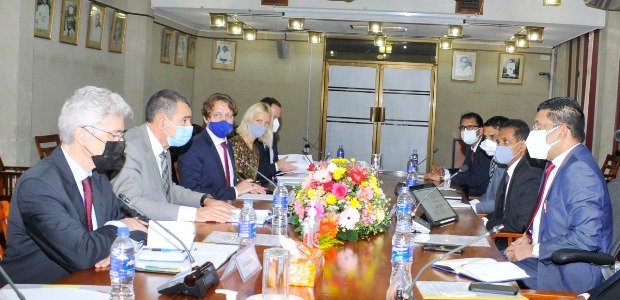COLOMBO –The five-member delegation from the European Union (EU) currently in Sri Lanka to review the Generalized Scheme of Preference Plus (GSP+) trade concession amid renewed concerns over human rights abuses, held crucial talks with Justice Minister Ali Sabry on Tuesday (28).
The justice ministry said the delegation discussed a wide rand of issues, including the process to amend the Constitution, the state of the judiciary and other matters which come under the purview of the minister.
The EU delegation, which arrived in Sri Lanka on Monday (27), is slated to meet a number of officials including President Gotabaya Rajapaksa and all key stakeholders over the next few days, to assess the progress of Sri Lanka’s pledges to comply with 27 international conventions in return for the GSP+ trade concession.
The European Parliament in June adopted a resolution to consider withdrawing the more than US$ 500 million worth of trade concession. Its key demand was that Sri Lanka repeal the Prevention of Terrorism Act (PTA), which has been systematically used for arbitrary arrests and the detention of Muslims and minority groups in Sri Lanka.
International rights groups have asked the EU to demand Sri Lanka to comply with its obligations to continue the trade concession.
“Under President Gotabaya Rajapaksa, the Sri Lankan government has suppressed civil society, silenced protesters, targeted vulnerable minorities, further misused the abusive PTA, and reversed any progress on accountability for war crimes,” EU director at Human Rights Watch Lotte Leicht said in a letter last week.
“The EU should call out these blatant violations of Sri Lanka’s obligations under the GSP+ rules and be clear about the consequences if human rights violations and impunity for war crimes persist.”
The Rajapaksa government has denied the allegations.
The EU is the second-largest export destination for Sri Lankan products, and GSP+ has helped the country’s exporters to consolidate their position.
Around 7,000 Sri Lankan export items are covered under GSP+, of which around 60% are apparel, 11% are rubber products, 9% are gems and jewellery, 3% agriculture and around 17% other products, including wood products, toys and tableware.
-ENCL


